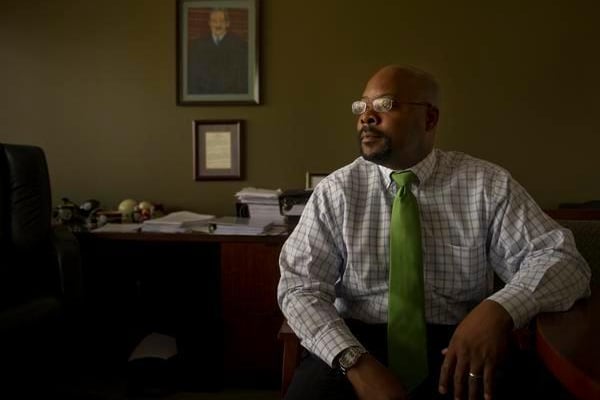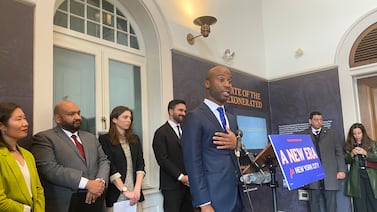Sign up for Chalkbeat Colorado’s free daily newsletter to keep up with education news from Denver and around the state.
Update: On Wednesday the Aurora school board voted unanimously not to take action on the recommendations related to Rico Munn’s discrimination complaint.
For years Black and Hispanic teachers in the Aurora school district have complained of mistreatment and discrimination — even as the district was led by a Black superintendent and equity efforts to hire and retain more teachers of color ramped up.
Whether that superintendent, Rico Munn, did enough to support Black educators is behind a discrimination complaint Munn filed as he departed the district under a negotiated agreement.
According to two independent investigations, Munn alleged that Black board members Stephanie Mason and Tremaine Duncan called his Blackness into question and expected him to act in certain ways because he was Black while holding him to unwritten expectations — actions that he said ultimately created a hostile work environment and led to him being unjustly removed from his position.
Rodrick D. Holmes, an outside investigator who interviewed Munn, the seven board members, and a consultant who has worked with the board for years, concluded that poor leadership, interpersonal conflicts, and an intense focus on race all contributed to the board’s decision not to renew Munn’s contract. But Holmes did not find evidence of racial discrimination.
But a second outside investigator working off the Holmes fact-finding report reached the opposite conclusion.
Doug Hamill found that the board as a whole — and specifically Mason and Duncan — engaged in a pattern of discrimination, calling Munn’s “Black card” into question and that the board as a whole essentially fired Munn. That investigator recommended that the board censure Mason and Duncan, post the conclusions of the investigation online for the public to read, and that the board undergo training.
The board has an executive session scheduled Wednesday evening to get legal advice about the complaint. While the agenda doesn’t include a public discussion, the board could still choose to talk about it. School board members have refused interviews ahead of that meeting. Munn said he is dealing with a family medical issue and is not doing interviews.
The two investigations and conflicting conclusions shed light both on Munn’s departure and on long-standing challenges faced by one of Colorado’s most diverse districts when it comes to hiring and retaining educators who reflect the students they serve.
The district’s next superintendent, Michael Giles, will be charged with making improvements the board majority felt Munn couldn’t achieve, including to retain Black educators, to significantly improve outcomes for Black students, and to work with a board that has struggled to get along with each other and with their superintendent.
Aurora district’s focus on equity has evolved
The Aurora school district serves about 40,000 students, including 86% who are students of color. Aurora is home to many refugee communities.
In the 10 years of Munn’s tenure, the percentage of students of color in the district has increased slightly, even though the percentage of Black students has decreased slightly.
When a school board with no Black members hired Munn in 2013, equity was one of his stated priorities, but in recent years, other more diverse school boards pushed him to do more.
Munn worked to reduce the number of students who were expelled, attempted to increase the number of principals of color, and paired schools with programs that aimed to cultivate teachers from the district’s diverse student body. Later, he launched a mentoring program for young men of color.
The school board has created goals around equity targets and regularly has discussions about how that work progresses. At times, those discussions have been tense.
The district did see improvements in some student outcomes. Hispanic students made some of the largest gains in graduation rates in the state. Aurora Black students made huge gains too, and have a higher graduation rate than the state average for Black students. In one metric the board monitored — how many Black and Hispanic sixth grade students were on grade level in English tests — Black students made progress and were doing better than the district’s Hispanic students, though both groups still lag behind white and Asian American students.
But when it came time to evaluate Munn against these targets, the board decided to skip his evaluation, citing lack of test data during the pandemic. When the school board voted 4-3 late last year not to renew Munn’s contract, all they would say was that there had been a conflict in their vision. Munn negotiated to continue consulting for the district through this fall to help onboard a new superintendent.
After he stepped down from his superintendent position, Munn filed a discrimination complaint. According to district policy, such complaints are reviewed first by a fact finder and then by a separate decision maker who recommends corrective action if appropriate. In this case, the district decided to contract out both roles to avoid any conflicts of interest since the complainant was the former superintendent. The district spent more than $30,000 on the two contracts.
Much of the investigation centers on Mason, who joined the board in 2019 and whose term is up this year. She has not said if she’s going to run for re-election. Mason has focused primarily on teacher issues. In early 2020, she presented a resolution that would hold the district more firmly to goals around recruitment and retention of educators of color.
It helped spur more work, including with consultant Promise54 to draft a plan addressing the challenges teachers have identified, such as a lack of data, unclear goals, and inconsistent initiatives.
The district also has written more goals around equity, including one that at least 60% of respondents in staff surveys should report that they believe “APS has an explicit commitment to equity.” In 2020, 58% agreed but by May 2022, that dropped to barely over half.
Teacher retention goals central to complaint, fact-finding report
According to both Holmes’ fact-finding report completed in May and Hamill’s decision-making report released a month later, Munn’s discrimination complaint was closely tied to how the board interpreted district goals around equity, especially teacher retention.
At board meetings, Mason raised concerns she had heard from Black educators and questioned statistics that showed progress.
Munn alleges that Mason insisted Munn “act more Black” to achieve policy outcomes. He said the board judged him exclusively on retaining Black educators when the board goals talked about educators of color. He said that the way board members expressed their concerns frequently crossed the line into harassment. He said other board members allowed mistreatment to continue unabated.
After interviewing all seven board members, Holmes concluded there were insensitive communications and poor leadership on the part of the board, but he did not believe those problems constituted discrimination because board members Mason and Duncan are also Black. Holmes also states that because Munn negotiated a transition out of the district, as opposed to being fired, it means he doesn’t have an adverse outcome from the discrimination to be able to contest. And he said the evidence did not amount to a hostile work environment.
“Munn asserted in his complaint and during his interview that Board members commented on his Blackness and the racial makeup of his leadership team, both publicly and privately. However, not a single member of the Board substantiated Munn’s allegations,” Holmes wrote.
Based on Holmes’ fact-finding report, Hamill reached the opposite conclusion. Hamill cited court cases to say that if Munn resigned because he knew he was being pushed out, that constitutes being discharged, or fired, meaning he did suffer as a result of the harassment, and that it doesn’t matter his critics were also Black. Hamill also concluded that Mason and Duncan not believing that Munn was “Black enough” — as reported by Munn and some witnesses — is enough evidence to determine that the termination was racially motivated.
“Mr. Munn’s ‘Black Card’ was constantly questioned or ‘up for examination,’” according to Board consultant Crabill. Further evidence of pretext includes the lack of factual basis for the Board’s decision not to renew Mr. Munn’s contract,” Hamill wrote.
AJ Crabill, a consultant who has been working with the Aurora school board for years, told Holmes that it was obvious that some school board members wanted Munn to “focus his efforts on the retention of Black and Brown staff, rather than just people of color. Crabill emphasized that it is important for the Board to be explicit and candid about its goals and expectations,” and suggested that they change the language in their goals to reflect that.
The board did just that in September 2022 — updating their guidance to say the superintendent “will not allow the retention rate of Black and Hispanic/Latino educators to be significantly below the retention rate of all educators in APS-operated schools.” This was around the same time board members were privately discussing whether to renew Munn’s contract.
In November 2022, Munn gave his first and only progress report on that goal. The data he presented showed Black teachers have the lowest retention rates in the district — a worrying contrast from January 2020, when Munn reported that Black and Hispanic teachers had higher than average retention rates.
In his interview with investigators, Crabill noted that Munn’s data on retention rates for employees of color was often challenged, but that board members “never had any countervailing data to present, and the attacks on Munn’s data were supported only by opaque anecdotal experience.”
Since Munn was hired in 2013, the district has increased the number of non-white teachers. The number of Black teachers went from 74 to 104, or 4.3% of all teachers. Hispanic teachers went up from 205 to 230, to 9.7%.
The district also slightly increased the number of Asian teachers, from 49 teachers to 56, just barely more than 2% of all staff.
The Holmes report describes Munn accusing Mason of making anti-Asian remarks and not considering members of the Asian community to be people of color. The comments came in the context of criticizing Munn’s leadership team, which Mason did not consider to be diverse enough.
According to the report, Mason denied making anti-Asian remarks, but said she did tell Munn that “one Asian person does not make his Leadership Team diverse… [and] that his executive team was not diverse because it did not have adequate Black representation.”
When Munn stepped away from the role of superintendent, at least three of the members of his leadership team were Black.
In her interview with Holmes, Mason also admits that she “‘probably’ used the term ‘Black’ more often in reference to diversity, but during meetings with the Board she meant ‘everyone’ not just Blacks.”
Duncan, whom the decision-maker Hamill also found to have discriminated against Munn, denied wrongdoing in his interview with Holmes, the fact-finder. But he did say that when Munn asked for guidance on diversity work, “the Board told Munn the focus should be on retaining Black and Brown teachers.”
The reports could further drive a wedge between school board members who already struggle to agree on issues.
The Hamill report that concludes board members Mason and Duncan discriminated against Munn in part uses comments made by other board members to reach that conclusion. For example, board member Michael Carter, who is also Black, told Holmes that he thought firing Munn was “BS,” and “recalled APS staff and Board members remark that Munn was not black enough, but Carter could not identify any specific individuals.”
Hamill concludes with several major recommendations: that Mason and Duncan be publicly censured by their colleagues, that they be barred from holding leadership positions on the board, that the board publicly post the findings favorable to Munn on the district website for at least a year, and that the entire board receive training on the district’s anti-discrimination policy and federal Equal Employment Opportunity laws.
Crabill, who has worked with the board for years to try to prevent them from micro-managing Munn and stick to setting policy, told the investigator that training might not make a difference, because it would “not change engrained life-long beliefs.”
Yesenia Robles is a reporter for Chalkbeat Colorado covering K-12 school districts and multilingual education. Contact Yesenia at yrobles@chalkbeat.org.






